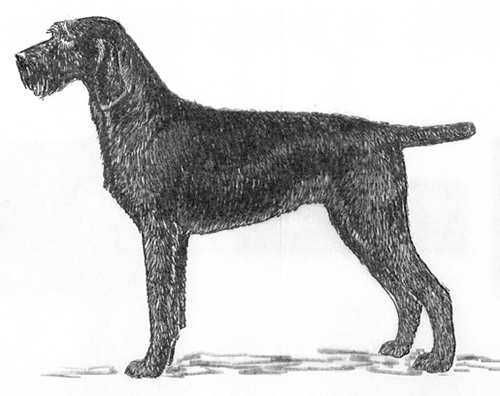Pudelpointer
Gun Dog Group
The goals and purposes of this breed standard include: to furnish guidelines for breeders who wish to maintain the quality of their breed and to improve it; to advance this breed to a state of similarity throughout the world; and to act as a guide for judges.
Breeders and judges have the responsibility to avoid any conditions or exaggerations that are detrimental to the health, welfare, essence and soundness of this breed, and must take the responsibility to see that these are not perpetuated.
Any departure from the following should be considered a fault, and the seriousness with which the fault should be regarded should be in exact proportion to its degree and its effect upon the health and welfare of the dog and on the dog’s ability to perform its traditional work.
History
The Pudelpointer originated in Germany, created by crossing the Poodle with the Pointer. A versatile, genetically sound and healthy gun dog emerged from this cross. The breed is useful for all kinds of work in the fields, woods and water.
The Pudelpointer was recognized by the United Kennel Club in 2006.
General Appearance
A Pointer of heavy type with a rough, not too long coat that is dead leaf or black in color.
Characteristics
A calm, self controlled, even temperament with a strong hunting instinct.
Head
SKULL
The skull is flat, moderately broad, and rounded at the sides, with pronounced superciliary ridges.
MUZZLE
In balanced proportion of length and width, neither narrow nor pointed, with a straight nasal bridge. The muzzle is the same length as the skull.
TEETH
The Pudelpointer has a complete set of evenly spaced, white teeth meeting in a scissors bite.
Disqualifications: Overshot, undershot, or wry bite.
NOSE
Strongly pigmented according to the color of the coat.
EYES
Large, set at the sides of the head, dark amber in color. The lids are tight and the expression is lively.
Disqualifications: Entropion or ectropion.
EARS
Medium sized and set on high, flat lying, with rounded tips, and well covered with hair.
Neck
Medium length, slightly arched, no dewlap.
Forequarters
The shoulder blade is tight fitting, and forms a good angle with the long upper arm, setting the legs well back under the body.
FORELEGS
Straight and parallel with strong bones and joints. The elbows are close to the body, and the forearms are long, lean and well muscled. The pasterns are slightly sloping.
Body
In proportion, the body is slightly longer than tall in a ratio of 10:9. The chest is broad and deep, and the ribs are well sprung but not barrel shaped. The withers are pronounced, and the back is short, straight and firm. The loin is well muscled, and the croup is of medium length and slightly sloping. There is a slight tuck up in an elegant curve.
Faults: Swayback or roach back.
Hindquarters
Viewed from behind, the legs are straight and parallel, with strong bone.
HIND LEGS
The upper thigh is long, broad and well muscled. The stifle is strong and well angulated. The lower thigh is strong and sinewy. The hock joint is very well angulated and the rear pasterns are short.
Faults: Barrel legged, cow hocked, or close behind.
Feet
Round or oval. and well knit, with not too long hair.
Tail
Set on in an even, unbroken line with the croup, the tail is straight, and should not be carried steeply erect. It is generally docked, but if natural it should reach to the hocks and be carried saber like.
Coat
Close, flat lying, hard rough coat of medium length, with dense undercoat. The head shows a beard and a forelock. The coat on the belly is close and dense. The coat should provide strong protection against the weather and injuries.
Faults: Coat too long, too thin or lacking undercoat.
Disqualification: Lack of a beard.
Color
Solid brown, dead leaf or black, with or without small white markings.
Disqualification: Any color or marking not specifically mentioned in the standard.
Height
Height at the withers for males is 23.5 to 27 inches. For females, it is 21.5 to 25 inches.
Gait
Upstanding, far reaching and springy, straight and parallel coming and going.
Fault: Stiff or mincing gait.
Disqualifications
(A dog with a Disqualification must not be considered for placement in a conformation event, and must be reported to UKC.)
Unilateral or bilateral cryptorchid.
Viciousness or extreme shyness.
Albinism.
Overshot, undershot, or wry bite.
Entropion or ectropion.
Lack of a beard.
Any color or marking not specifically mentioned in the standard.
The docking of tails and cropping of ears in America is legal and remains a personal choice. However, as an international registry, the United Kennel Club is aware that the practices of cropping and docking have been forbidden in some countries. In light of these developments, the United Kennel Club feels that no dog in any UKC event, including conformation, shall be penalized for a full tail or natural ears.

Looking for a Dog?
Find a dog that will fit your family.
Note: The breeders on this list are not endorsed by UKC.
©Copyright 2006, United Kennel Club
